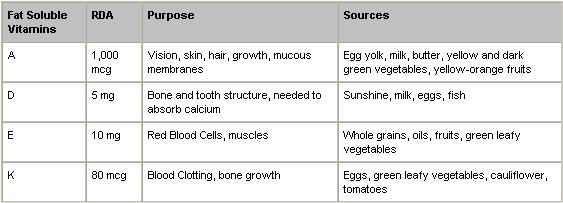|


| |
 |
Vitamins |
Vitamins are organic compounds not manufactured by the body other than proteins, carbohydrates and fats that
are required for growth, maintenance and repair. Vitamins require no digestion and are absorbed directly into the
blood stream. The thirteen vitamins identified are divided into two groups, fat-soluble and water-soluble. The
fat-soluble vitamins, which include A, D, E, and K are stored in the liver and in body fat. Mega doses of fat-soluble
vitamins can produce a toxic effect in the liver and can accumulate in the tissues. Symptoms of toxicity are bone
and joint pain, blurred vision, dry skin, and hair and weight loss. The body does not store water-soluble vitamins.
The kidneys excrete excess or Mega doses of these vitamins. However, toxicity has been reported with A, niacin,
C, D and B6. Recommended Daily Allowances (RDA) are currently being revised.


 | Minerals |
Minerals, in contrast to vitamins, are inorganic. Minerals also require no digestion. Some minerals are stored in the
liver. It is important not to consume Mega doses of minerals on a regular basis above those amount recommended.
Minerals are divided into two groups, major and trace minerals. Major minerals are those that are required by the
body in quantities greater than 100 mg per day and include Calcium, Magnesium, Phosphorous, Chloride and Sodium.
Trace minerals are those that are required by the body in quantities less than 100 mg per day. Trace minerals are
Iron, Copper, Zinc, Iodine and Selenium. Recommended Daily Allowances (RDA) are currently being revised.

|